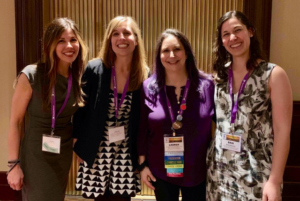Researchers seek parents’ help to understand eating disorder recovery
Researchers seek parents’ help to understand eating disorder recovery

(L to R): Leslie Sim, Ph.D., Jocelyn R. Lebow, Ph.D., Lauren Muhlheim, Psy.D., Erin C. Accurso, Ph.D.
“Looking at the data we have so far, we honestly have GOLD. Parents have some really interesting qualitative responses”
– researcher, Erin Accurso
Parents know their kids best! Understanding this, researchers believe that parents hold valuable information about their children with eating disorders that will help us better understand eating disorder recovery and improve eating disorder treatment.
A clear definition of what constitutes recovery from an eating disorder is important for studying and designing treatment for eating disorders. Yet, there is little consensus on a definition. This was made clear at a plenary that was held at the 2018 International Conference on Eating Disorders, Recovery from an Eating Disorder: How Do We Define It? What Does It Look Like? And Should It Always be the Focus?
At this plenary, researcher Anna Bardone-Cone defined recovery as incorporating three components: physical, behavioral, and cognitive. The response to the plenary showed that Dr. Bardone Cone’s definition was not the final word, with different constituents—therapists, researchers, patients, and parents—all sharing their own ways to define recovery.
Also in 2018, Jocelyn Lebowand Leslie Sim, both researchers at the Mayo Clinic in Minnesota—and Erin Accurso, a researcher in the UCSF Eating Disorders Program—wrote a paper, “Is there clinical consensus in defining weight restoration for adolescents with anorexia nervosa?” (2018). In this paper, Lebow and colleagues draw attention to the lack of consensus by professionals in the field in determining weight recovery from anorexia nervosa.
In order to better understand the impact of weight recovery in anorexia, Lauren Muhlheim, psychologist and owner of Eating Disorder Therapy LA, has joined the three above researchers to design the current study. We believe parents are an untapped resource and hold valuable information that can help us further define and understand recovery.
How to take part in the study
Understanding Carers’ Experience in Treatment for Their Child’s Eating Disorder
Principal Investigator: Jocelyn R. Lebow, Ph.D.
Additional Investigators: Erin C. Accurso Ph.D., Leslie Sim Ph.D., and Lauren Muhlheim Psy.D.
Parents are being invited to participate in a research study to understand carers’ experience in treatment for their child’s eating disorder. This invitation is being posted on blogs and social media groups and is being sent to listservs for parents of children or adolescents who either have had or currently suffer from an eating disorder. If you agree to participate, you will be asked to complete a 30-minute online survey.
The research team will ask you questions about your experiences during your child’s treatment and your personal definition of “recovery” for your child. The survey is anonymous—your answers cannot be identified or traced back to you.
The risks and burden associated with this research study are minimal. While there is no direct benefit to you if you choose to take this survey, the research team believes that this research study will provide a better understanding of carers’ perspectives of their children’s treatment and recovery, with the goal of improving treatment and outcome assessment.
The researchers wish to make clear that this is a voluntary study and a decision to participate or decline will not affect a research participant’s current and future medical care at Mayo Clinic. Contact the Mayo Clinic Institutional Review Board (IRB) to speak to someone independent of the research team at 507-266-4000 or toll-free at 866-273-4681 if you have questions about rights of a research participant.
The researchers express that they are very grateful to parents for sharing your time and expertise.
Link to study: http://bit.ly/ParentSurveyOfRecovery





